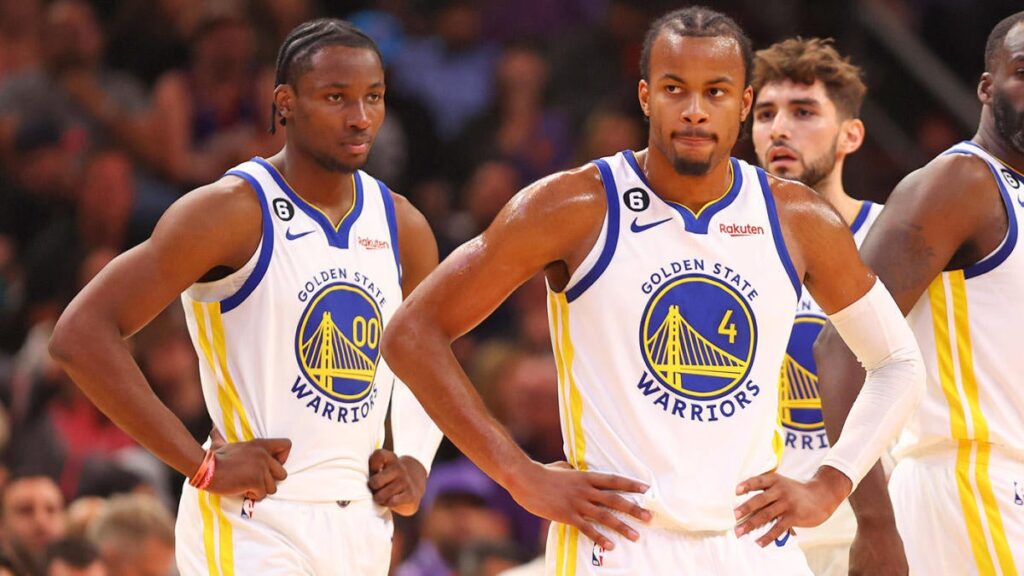Less than six weeks from the Oct. 21 deadline, the Golden State Warriors’ Jonathan Kuminga and Moses Moody have not signed rookie contract extensions. According to The Athletic’s Anthony Slater, Golden State has not made significant progress toward a deal with either of them.
If they don’t sign extensions, Kuminga and Moody will be restricted free agents next summer. Both players were selected in the 2021 lottery, Kuminga No. 7 overall and Moody No. 14. Four players from their draft class — No. 1 pick Cade Cunningham of the Detroit Pistons, No. 2 pick Evan Mobley of the Cleveland Cavaliers, No. 4 pick Scottie Barnes of the Toronto Raptors, and No. 8 pick Franz Wagner of the Orlando Magic — have already signed extensions. All of their teams, however, were willing to offer max contracts worth $224 million over five years. Moody hasn’t played a big enough role in his first three seasons for that to be remotely realistic, and to this point Golden State has not been willing to offer Kuminga a salary in that range, per The Athletic.
The Kuminga situation is complicated. As The Athletic noted, he said in March that he’d like to be a “Warrior for life,” but at that point he was happy with his role and thriving in it. Golden State coach Steve Kerr was starting him at power forward, with Andrew Wiggins at the 3 spot and Draymond Green playing smallball 5. A couple of weeks after that interview, Kuminga had to sit out for six games because of tendinitis in his left knee. Kerr started Green at the 4 next to rookie big man Trayce Jackson-Davis during that stretch, and, when Kuminga returned to the lineup, he came off the bench for a few games, including the Warriors’ play-in loss against the Sacramento Kings.
Kuminga is one of Golden State’s most talented players, and he’s still a few weeks away from his 22nd birthday. The reason that his role has fluctuated so much, though, is no mystery: He’s not much of a floor spacer. He is a career 34.1% 3-point shooter, and, on a per-possession basis, he attempted 3-pointers slightly less frequently than Green did last season. Back in March 2023, Kerr was transparent about the fact that the Warriors couldn’t play Kuminga at small forward if opposing teams didn’t respect his 3-point shot, particularly if they wanted to pair Green with Kevon Looney in the frontcourt. Kerr said basically the same thing this past April at his end-of-season press conference, after Green and Jackson-Davis had found success defensively.
“I think what JK is looking at is: How can he make himself more versatile to be available in different lineups?” Kerr told reporters. “Can he be a 3? It’s a big question, and I don’t know the answer to it. But know that, as we continue to help him and he continues to learn how to create spacing and get his shot off a little quicker and be more comfortable catch-and-shooting, but also making the right reads — because as a 3 you handle the ball more — can he become a better passer?
“I think he sees the floor pretty well, but his fundamentals in terms of passing have to improve if he’s going to play the 3. We need him to play the 3 if we want to have Trayce out there at the 5 and Draymond [at the 4]. That ideally would be a great defensive lineup athletically and [in terms of] length. But we’re not ready for that yet as a team, and so those are the areas that would really be helpful for JK and we’re going to work with him on that stuff all summer.”
If the Warriors aren’t confident in Kuminga’s ability to function as a wing, how much long-term money can they realistically commit to him? According to The Athletic, “tentative” conversations about an extension have occurred, but “a clear divide” remains.
Moody doesn’t have the same unanswered questions about his game. He’s made 36% of his 3s in each of his first three seasons, and he attempted them at a frequency that more than doubled Kuminga’s last season. His skill set suggests that he can play with just about any kind of lineup as a 3-and-D-and-more role player, so it feels a bit strange that his minutes have at least somewhat erratic throughout his tenure in Golden State. Kerr’s coaching staff, however, has consistently dealt with an unusual problem for a team that has missed the playoffs for two years running: The roster has been deep with rotation-caliber players. Moody is more well-rounded than some of the Warriors’ reserves, but he has nonetheless occasionally been the odd man out.
This could continue to be a problem in 2024-25. The newly signed De’Anthony Melton will presumably be ahead of Moody in the wing rotation, and, if Moody doesn’t quickly solidify his spot, he could wind up in a precarious place. If Kerr is looking for defense, Gary Payton II could play over Moody. If Kerr is looking for shooting, Buddy Hield could play over Moody. If Kuminga returns improved and shows that he can play small forward, it would be amazing news for him and the Warriors and bad news for Moody’s minutes.
Another factor here: Golden State’s front office believes, per the Athletic, that in between now and next February’s trade deadline, its salary-cap flexibility is a strength. The Warriors did not end up acquiring a star like Paul George or Lauri Markkanen in the offseason, but they remain in position to be opportunistic if a viable win-now trade presents itself.
If Kuminga or Moody were signed to an extension before the season, it would mean that they could not be utilized as trade assets in this particular situation.

